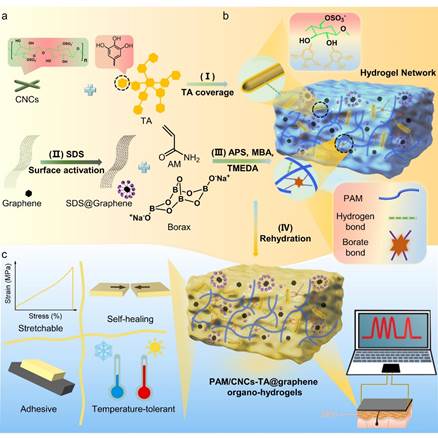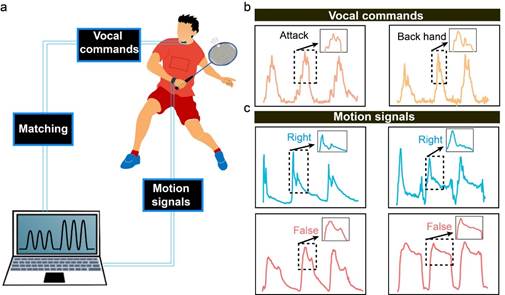Flexible sensors are promising for many potential applications in human motion and health detection, wearable electronics, electronic skin and human-computer interaction. Conductive hydrogels are considered popular materials for developing soft electronics with their distinct advantages, such as controllable conductivity, high malleability/comfortability, excellent biocompatibility, reliable and stable signals under different strains, and real-time signal transmission. However, they are confronting several limitations on service life, long-term stability, and usability in extreme environments.

(a) Schematic fabrication of PAM/CNCs-TA/graphene organohydrogel. (b) Internal interactions within organohydrogel. (c) Unique properties and potential sensing applications of PAM/CNCs-TA/graphene organohydrogel. [Photo/https://doi.org/10.1016/j.cej.2023.141905]
Associate Prof. Han Linbo from College of Health Science and Environmental Engineering, Shenzhen Technology University (SZTU), and his research team developed a novel conductive organohydrogel as a strain sensor that is adhesive (220 kPa at porcine skin), stretchable (3734 %), temperature-tolerant (-30 ∼ 60 °C), self-healing and conductive tough. It could be retained even after being treated under a harsh environment (-30 °C for 24 hrs/60 °C for 96 hrs) or stored in ambient conditions for up to 60 days.
With excellent reliability and a wide sensing range (5 %-1500 %), the organohydrogel-based sensor can precisely monitor human joint movements, wrist pulses, micro-expressions and vocal signals. Thus, the developed organohydrogel sensor shows great promise as wearable devices for intelligent speech-motion recognition, rehabilitation training and human-computer interaction.

(a) Schematic of real-time monitoring of voice commands and motion signals. (b, c) when an identical voice command matches well with a motion signal, it would be referred as right, and other motion signals would be recognized as false. [Photo/https://doi.org/10.1016/j.cej.2023.141905]
The research team published an article titled “Nanomaterials-enhanced, stretchable, self-healing, temperature-tolerant and adhesive tough organohydrogels with long-term durability as flexible sensors for intelligent motion-speech recognition” in Chemical Engineering Journal (IF: 16.744). Associate Prof. Han Linbo is the corresponding author and postgraduate Qin Tao the first author.
Drafted by Daisy(姚琦)/ International Cooperation & Student Affairs Office
Revised by International Cooperation & Student Affairs Office
Edited by International Cooperation & Student Affairs Office
